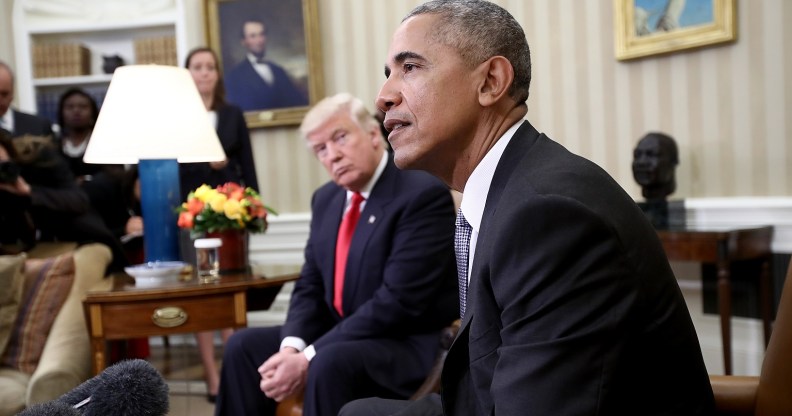Religious groups angered by President Trump vow to keep LGBT act

(Getty)
Religious conservatives in America have expressed their unease after President Trump promised to protect rights for LGBT workers.
The Republican previously sparked fears he would row back on a executive order by President Obama protecting their rights, however, a statement from the White House later confirmed he would uphold the bill.
While the statement was greeted with relief from the LGBT community, it has sparked anger from religious groups, who label it as ‘absurd’.
Mat Staver, chairman of Christian legal group Liberty Council, said the Obama order “imposes the LGBTQ agenda” on the country.
Speaking to BuzzFeed, he added: “President Trump should not continue to impose Obama’s bad executive order that goes far beyond federal law.
“The fluid and subjective term ‘gender identity’ does not prevent discrimination into the workplace but rather injects in the workplace an agenda that is harmful to businesses and to other employees.”
Mr Staver also claimed the protections “open women’s restrooms to men”.
Obama’s 2014 order banned LGBT workplace discrimination by federal contractors and the federal government.
The bill applied to roughly 24,000 companies and 28 million employees – a fifth of America’s overall workforce.
However, religious groups claim it created ‘protected classes’ on the basis of sexual orientation and gender identity – even though these are not mentioned in the Civil Rights Act 1964.
One of Donald Trump’s campaign promises had been to add a religious exemption to the bill – but later pledged to be “respectful and supportive” of LGBT rights, “pledging then to protect the community from violence and oppression”.
Ryan Anderson, a policy researcher for the Conservative think tank the Heritage Foundation, also branded the pledge “a mistake”.
“Many organisations, including faith based groups, have beliefs about human embodiment that people are male and female – and that females and males are made for each other,” he added.
“The federal government shouldn’t penalise those groups when they operate according to their convictions.”

